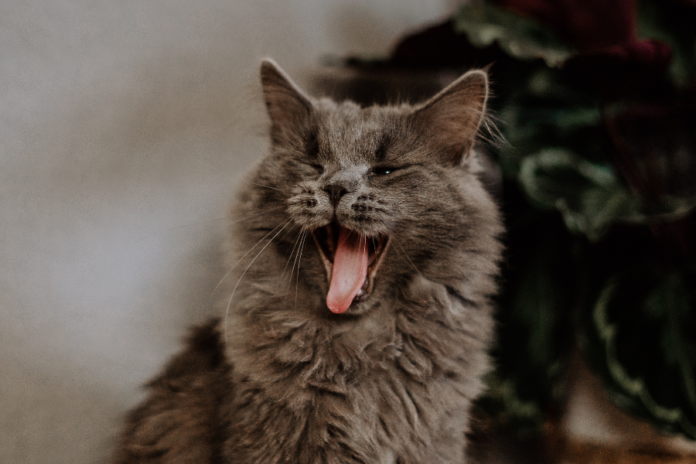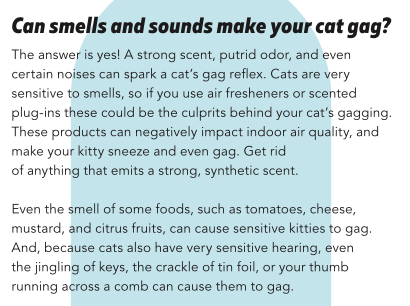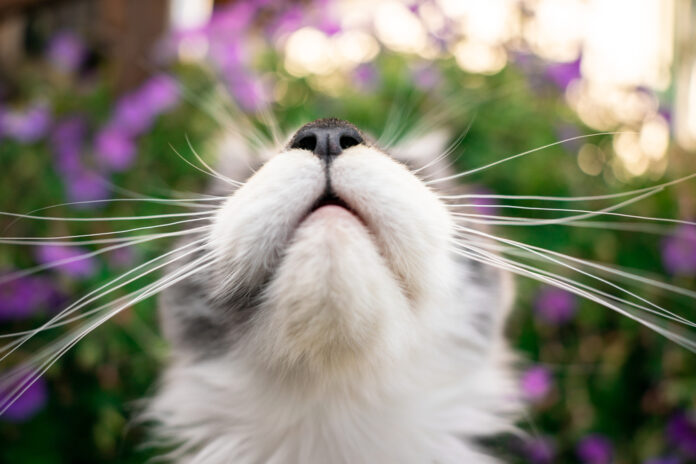Why do cats gag?

Does your cat gag a lot? While some gagging is normal and natural, it may signal a health issue if it happens often.
Your cat is standing in the middle of the kitchen floor when she hunches over and starts to gag. A few moments later, up comes a hairball or a few pieces of unchewed food. Is this normal? Should your cat be doing this? It depends. Read on for a closer look at feline gagging and when you should be concerned.
GROOMING CAN LEAD TO GAGGING
The main reason cats gag is because they groom so much. A cat has a rough tongue covered with tiny barbs that feel like sandpaper. These barbs catch loose fur much like your hairbrush does, except in your kitty’s case the excess fur is swallowed. The fur goes into the stomach and most often passes into lower digestive system. Sometimes, however, the fur remains in the stomach and creates a hairball which the cat tries to vomit out by gagging. The scientific name for a hairball is “trichobezoar”. In fact, “hairball” is a misnomer since these yucky objects are usually slender and cylindrical rather than round.
WHEN GAGGING MEANS MORE THAN HAIRBALLS
If your cat doesn’t have hairballs, yet seems to be gagging frequently, he may have another problem that requires veterinary attention. “Gagging is a symptom that relates to many underlying health conditions in feline patients,”
says veterinarian Dr. Jared Mitchell. “It can be as simple as overeating or eating too fast, or may be linked to more serious conditions affecting the GI tract, such as foreign bodies and tumors. The sooner an issue is addressed, the quicker the proper diagnosis and treatment can occur.”
He adds that it’s not a good idea to help the cat vomit by sticking your fingers down his throat because it goes against his gag reflex. “If you are concerned, call and schedule a veterinary appointment for an exam and possible work-up, which may include bloodwork and x-rays. This is best for the cat, and for putting your mind at ease.”
Fast Fact: Like us, cats have a gag reflex. This allows the muscles in the throat to immediately contract and eject something they don’t like.
WAYS TO PREVENT GAGGING
1) Again, the first step, if your cat is gagging frequently, is to have your vet check him over to rule out any serious health problems.
2) If the gagging is being caused by hairballs, here are some tips to follow:
• Start brushing your cat regularly to help get rid of the excess hair. All cats shed, but if yours seems to be losing more fur than normal, switching him to a healthier diet and adding an Omega-3 supplement can help.
Fast Fact: Proper hydration is also important, so add extra moisture to his meals, or invest in a pet fountain (cats are often attracted to running water).

- Veterinarian Dr. Katie Kangas suggests feeding cats moisture- rich foods rather than dry kibble, processed food or anything with carb-heavy ingredients such as potatoes or legumes.
- Dr. Kangas also recommends giving cats marshmallow root. “It’s a natural mild laxative and supports movement in the GI tract,” she says. “It’s quite palatable for cats; it’s a clear, sticky liquid that is slightly sweet, and most cats are ok with it being added to their food.”
- Another option, says Dr. Kangas, is to “add about half a teaspoon of coconut oil to your kitty’s food daily. Coconut oil can act as a mild laxative and offers other health benefits too. And many cats are happy to eat it.”
- Adding more fiber to your cat’s diet is also important because it helps with GI motility. “Canned pumpkin is one good source of fiber and is accepted by many kitties. You can add half to one teaspoon to your kitty’s meals.”
3) Watch to see if your cat gags when exposed to certain smells or sounds. Remove anything that emits a synthetic scent. If he’s reacting to other smells or sounds, try to eliminate or minimize them.
All cats gag from time to time — it’s just a natural reflex. But if gagging is becoming a regular occurrence in your kitty, it’s time to find out what’s causing it and solve the problem.



